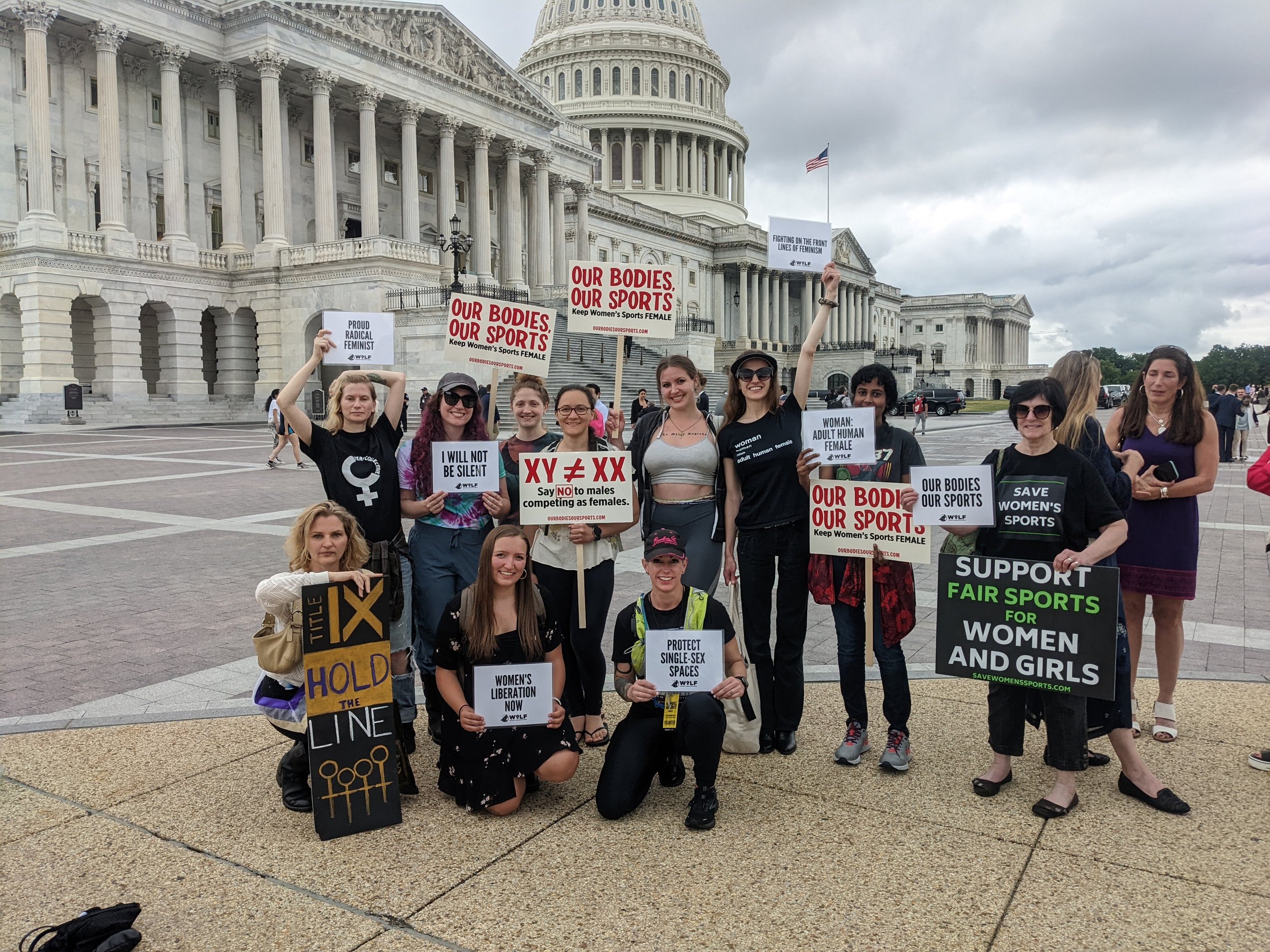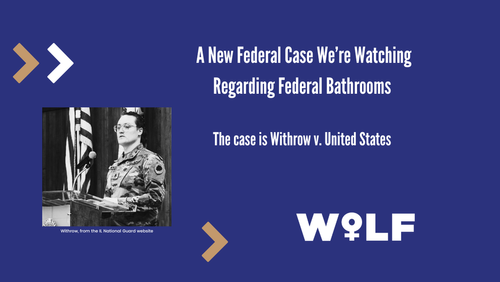
OUR Commitment to NonPartisan Work
About WoLF
Women’s Liberation Front (WoLF) is a nonpartisan radical feminist nonprofit based in the United States. Our work is to restore, protect, and advance the rights of women and girls. You can learn more about our four focus areas here.
As an organization, we are unwavering in our radical feminist principles. We are gender abolitionists. We view gender as a tool of the patriarchy to oppress women. “Gender” is another word for sex stereotypes. When we refer to battling against “gender ideology,” this means that we envision a world in which both females and males are free to uniquely express themselves without being forced to comply with stereotypes about what it means to be a “real woman” or a “real man.”
We seek an end to the global epidemic of male violence, including the violence of commercial sexual exploitation, sexual violence, domestic violence, and stalking. We unequivocally defend women’s reproductive autonomy and right to bodily sovereignty.
Political Independence
WoLF is proud to be a nonpartisan agency: we represent thousands of members, volunteers, donors, and allies in the United States and around the world. WoLF’s commitment to nonpartisanship goes beyond legal requirements as a 501(c)(3); we are proud to be truly independent and to represent a diverse group of stakeholders: sisters-in-action, volunteers, donors, staff, partners, and allies. We know that neither liberals nor conservatives fully align with radical feminist values or goals. We work with individuals and organizations representing almost all political belief systems to achieve common interests.
We don’t work for the left. We don’t work for the right. We work for women. All women.
We’re Small, but We Fight Fiercely
Charitable organizations focusing on women and girls are already underfunded: only 1.9% of all charitable giving in 2018 went to women’s and girls’ causes. Yet, women and girls comprise nearly 51% of the U.S. population, and organizations meant to address their struggles are ideologically captured by proponents of gender ideology or commercial sexual exploitation. Based on these figures, the true gap in serving women and girls is alarmingly evident.
WoLF is the leading 501(c)(3) public charity fighting for women’s sex-based rights in the U.S. legislatures and courts. WoLF is an extremely small organization compared to the gender ideology and commercial sexual exploitation giants we are up against. Our total annual budget is approximately 0.5 percent of the size of an organization like the Human Rights Campaign (HRC) or the American Civil Liberties Union (ACLU). Moreover, the size of WoLF’s staff team is less than 2 percent of HRC’s or the ACLU’s entire employment base.
Since our inception, we have taken on industry giants that have the power of every patriarchal system behind them. Our opponents are well-funded, control social media, and are gaining political ground. Make no mistake: we absolutely need all the help we can get, from a diverse set of partners.
History of Feminist Cross-Aisle Collaboration
Because of the vital importance of advancing women’s rights, feminists in the United States have been finding ways to work across the aisle for over a century. The 19th Amendment, which gave women the right to vote in the United States, was first introduced in Congress by a Republican Senator from California and was ratified in 1920 by a majority of Republican-controlled state legislatures.
Representative Katharine St. George, a Republican from New York, is most well known for coining the phrase “equal pay for equal work”. She was one of the primary authors of the Equal Pay Act, which ultimately passed in 1963 thanks to bipartisan cooperation on behalf of the women in congress at the time. The inclusion of “sex” in the 1964 Civil Rights Act as a protected class, which granted women much of the equality we enjoy today, was shaped by an alliance between conservatives and feminists.
Representative Martha Griffins of Michigan was known for her ability to work with colleagues regardless of party affiliation to advance women’s rights. In an interview with Slate, Christina Woldbrecht, author of The Politics of Women's Rights: Parties, Positions, and Change, argued that Griffins was a brilliant strategist and the largely uncredited mastermind behind women’s civil rights. When Howard Smith, a conservative segregationist, wanted to introduce the amendment to include “sex” in an attempt to derail the Civil Rights Act, Griffins let him — all while organizing women behind the scenes to make sure he would have the votes to pass it.
If Griffins, who was liberal, had been unwilling to work with conservatives or to appear to back conservative legislation, women in the United States might not enjoy civil rights today. Most of the rights of women in our country stem from this one piece of legislation.
Lindy Boggs, a Democrat from Louisiana, progressed women’s rights by focusing on economic equality. In 1974 she successfully added the words “or sex or marital status” to the Equal Credit Opportunity Act, giving women equal opportunity to manage their finances without a husband. Her successful tenure in congress is largely credited to the deep personal relationships she formed with her colleagues, including those from the opposing party.
Title IX, which prevents discrimination on the basis of sex in educational programs that receive Federal funding, was signed into law by President Nixon, a Republican.
Working Together for All Women
Achieving women’s rights requires independent, critical thinkers who value women’s autonomy and envision a world in which all women and girls are free from the harms of patriarchy.
Critics of WoLF often argue that we are “betraying” women if we work with groups or lawmakers who oppose any aspect of women’s rights. Women’s rights cross party lines and often require single-issue coalitions of the willing to move forward. For example, if a group agrees with us on one key issue (e.g. fighting commercial sexual exploitation) but not another (abortion) we will ally with that group only to achieve progress on the issue we both agree on. We typically participate in several limited-issue coalitions, including a workgroup that fights to protect single-sex prisons and a workgroup that seeks to keep men and boys out of women’s and girls’ sports.
WoLF members can be assured that we will always work to advance – and never undermine – women’s rights. By working collaboratively with groups with different constituents, we can educate far more people about radical feminist beliefs.
Additionally, through our partnerships, we have frequently helped our partners overcome some of their own personal biases about feminists and lesbians. As they have worked closely with WoLF, some of our conservative partners have come to realize that their beliefs about feminists and lesbians were based on stereotypes. Therefore, our partnerships have helped other people become more respectful and open-minded about different types of women.
We believe in using all of the tools, resources, and networks at our disposal to protect women’s hard-fought rights. For WoLF, with our focus on litigation and policy advocacy, this will always include our commitment to working with a variety of diverse partners. We are willing to work with lawmakers, agencies, and individuals who represent liberal beliefs, conservative beliefs, and independent political beliefs.
We don’t work for the left. We don’t work for the right. We work for women. All women.



